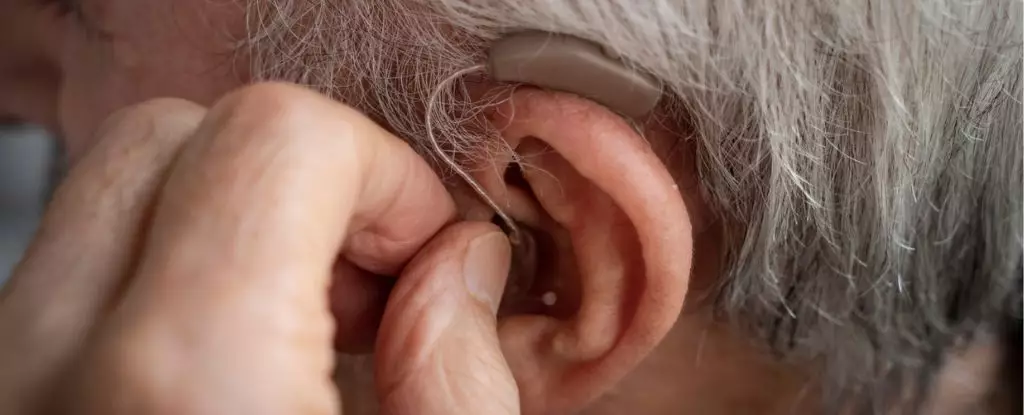Recent research has unveiled a striking correlation between hearing loss and the potential delay in the onset of Parkinson’s disease among a vast population of over 3.5 million U.S. veterans. The study indicates that individuals experiencing various degrees of hearing loss are increasingly likely to receive a Parkinson’s diagnosis later in life, with the severity and duration of hearing impairment being significant factors. More importantly, the timely use of hearing aids appears to counteract this trend, suggesting a promising avenue for prevention and intervention.
This compelling connection enriches the growing body of evidence suggesting that hearing loss is not merely a sensory issue, but also a potential risk factor for neurodegeneration. As we age, the health of our brain is intricately connected to the sensory functions that may seem unrelated at first glance. This study is pivotal in reinforcing the idea that managing hearing loss could be a critical measure in enhancing overall brain health.
One of the significant findings from the research is the substantial impact of hearing aids on cognitive health. A systematic review from 2022 illustrated that adults with hearing impairments who utilize hearing aids are 19 percent less likely to exhibit signs of cognitive decline than those who do not. More recently, a landmark clinical trial in 2023 corroborated these results, revealing that hearing aids might slow the cognitive decline rate by nearly 50% in older adults.
This revelation is particularly important given the overlapping nature of cognitive decline evidence in conditions like dementia and Parkinson’s disease. It was already well established that reduced vision and loss of smell could precede the more recognizable physical symptoms characteristic of Parkinson’s. The current study takes these findings a step further by highlighting hearing loss as a crucial factor that previously lacked extensive examination.
Led by neurologist Lee Neilsen at Oregon Health and Science University, the research conducted an extensive follow-up over two decades with a predominantly White male cohort of veterans, assessing various levels of hearing loss. The data revealed an alarming statistic: veterans with mild hearing loss, common in individuals in their 60s, showed a substantial cumulative risk for developing Parkinson’s over a 20-year period. The research team noted an addition of 10 Parkinson’s cases per 10,000 individuals correlated with mild hearing loss.
Encouragingly, those who received hearing aids either before or shortly after being assessed for hearing loss exhibited a reduced likelihood of developing Parkinson’s. This juxtaposition highlights the potential of hearing aids to play a preventative role, showcasing a noticeable difference even within the initial year of the study.
While the findings suggest a strong link between hearing aids and reduced risk of Parkinson’s, the underlying mechanisms warrant further investigation. It remains unclear whether hearing aids primarily restore lost neural connections—much like physical exercise rejuvenates muscle strength—or if they alleviate cognitive strain by reducing the energy demands on the brain. The potential impact of hearing aids on social interactions and emotional well-being is another variable that needs exploration, as improved social engagement can stave off feelings of loneliness and depression, both known contributors to cognitive decline.
Moreover, the combination of hearing loss with other early indicators of Parkinson’s, such as sleep disturbances, visual errors, or olfactory loss, appeared to exponentially heighten the risk of future diagnosis. This adds a layer of complexity to the argument supporting routine hearing evaluations during primary care visits, irrespective of the patient’s self-reported symptoms.
The implications of this research extend beyond academic curiosity; they offer a foundational rationale for public health initiatives aimed at early detection and management of hearing loss. As Lee and his team advocate, integrating hearing screenings into routine healthcare could unveil significant opportunities for intervention—potentially transforming hearing aid usage from a reactive measure into a proactive strategy for preventing neurodegenerative diseases.
The evidence presented accentuates the urgent need for randomized clinical trials to delve deeper into these associations and elucidate the mechanisms involved. In a world where aging populations are confronted with escalating rates of neurodegenerative disorders, prioritizing auditory health could emerge as a pivotal strategy in safeguarding cognitive vitality.
As research continues to shed light on the intricate links between hearing health and the potential for delaying Parkinson’s disease, we stand on the threshold of a new understanding of how our sensory experiences shape neurological outcomes. Investing in hearing health may well adjunct the journey toward maintaining robust brain function well into later life.


Leave a Reply